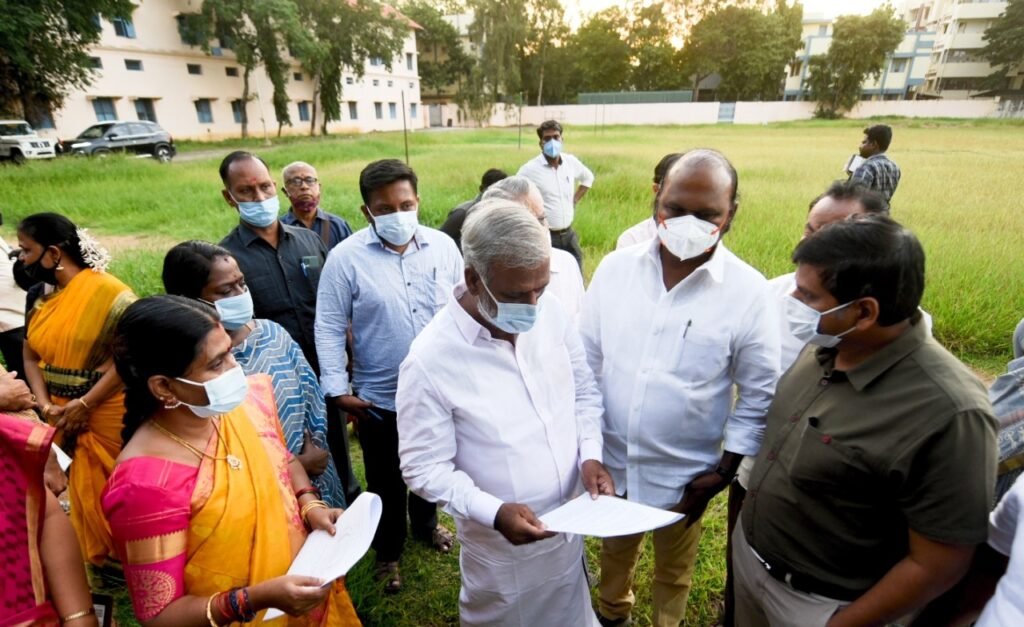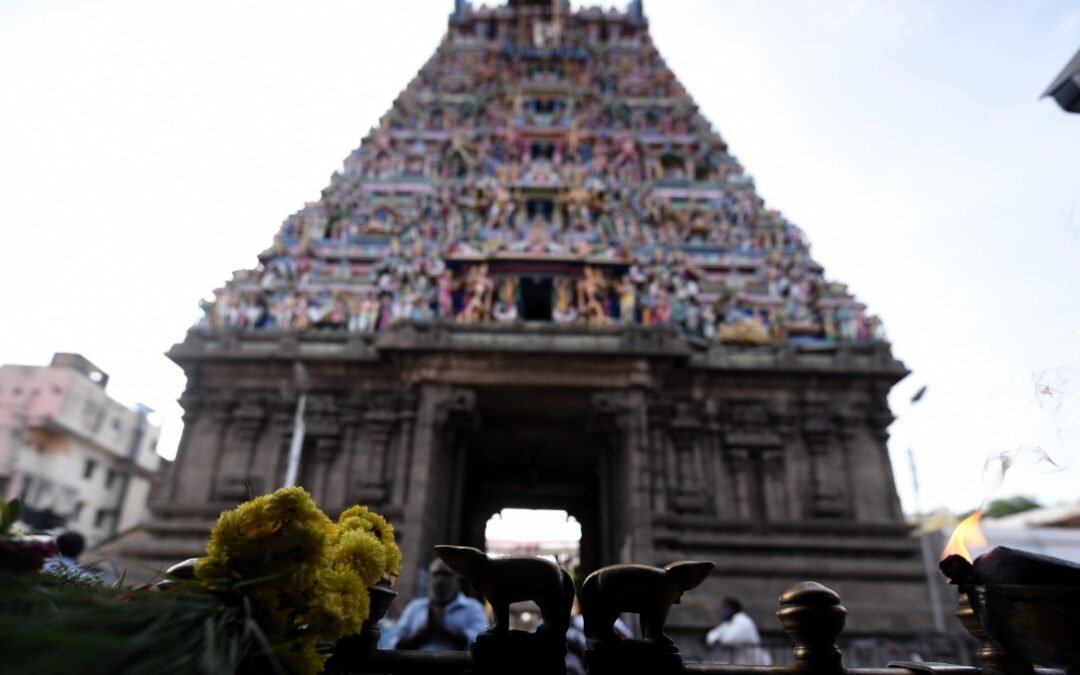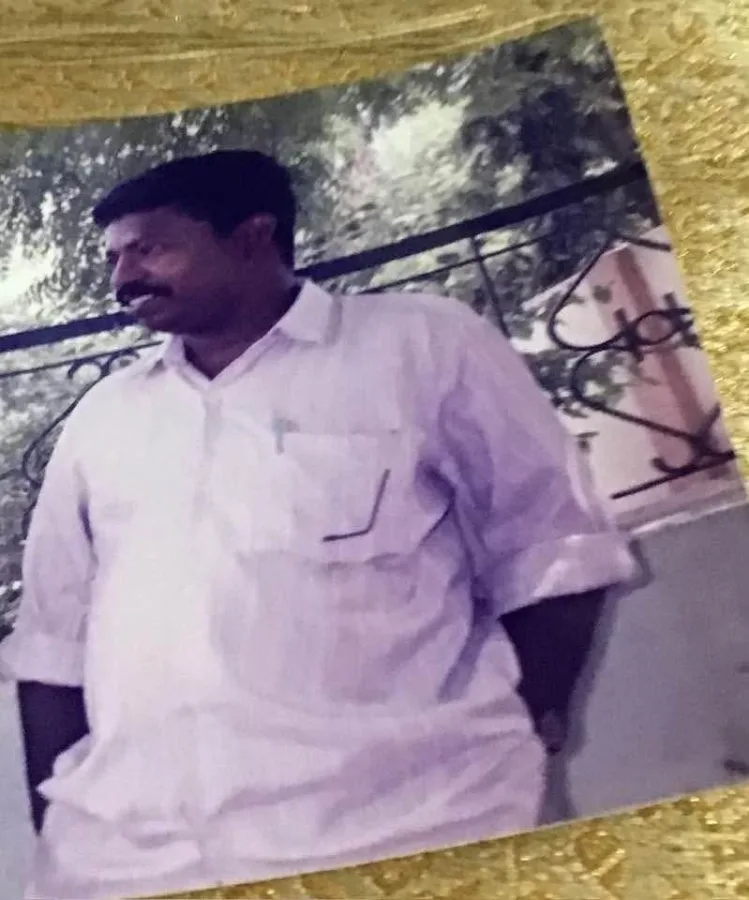Read in : தமிழ்
Mylapore Kapaleeswarar temple is among the wealthy ancient temples of Tamil Nadu holding extensive properties of over 600 acres around the temple and elsewhere. These properties were bequeathed by kings and others so the centuries-old temple’s functions and services could continue to be held as per tradition in a grand manner.
Lands owned by the temple have been leased or rented to shops, schools, clubs and others organizations to provide regular income to the temple. But there have been several cases of lease and rent payment defaults, say HR & CE officials. These defaults in payments cover property worth more than Rs 1,000 crore, they add. HR & CE Administration Officer Paranjothi has released a partial list of defaulters and all the names and properties will be revealed after a comprehensive inquiry is carried out throughout Tamil Nadu.

HR&CE minister P K Sekar Babu and senior officials at the PS High School ground
An HR & CE official told Inmathi that the Kapaleeswarar temple owns some 500 properties. The temple should, as per records, get an income of Rs 8 crore every year from these properties through lease and rent payments. But only some 60% of this amount is being earned currently, he said. Many of the lessees and renters are not making payments at market value, he added.
HR & CE minister PK Sekar Babu has said that details regarding defaulters on lease and rent payment of temple property are being gathered across Tamil Nadu. When the comprehensive list is compiled and released, the total value of property owned by Kapaleeswarar temple will be known. At the moment, the properties around the temple alone have been listed and it is believed that the ancient temple may have properties in other areas of the city and the rest of the districts.
The government has planned to survey all the lands belonging to temples across the state and put online all the details with patta numbers. Among the temples in the first batch of lands surveyed is Kapaleeswarar temple. At that time, the exact value of all the property encroached will be known.
Bharatiya Vidya Bhavan, an institution founded by freedom fighter KM Munshi in 1938 with the support of Mahatma Gandhi, owes Rs 32 lakh to the temple, said Paranjothi.
For now, some 473 defaulters have been identified regarding property around the temple premises. Bharatiya Vidya Bhavan, an institution founded by freedom fighter KM Munshi in 1938 with the support of Mahatma Gandhi, owes Rs 32 lakh to the temple, said Paranjothi.
PS High School had leased land of 82 grounds in 1928. In 1979, it renewed the lease agreement but has defaulted on the Rs 1,250 per year lease payment. The school has returned five grounds to the temple, so the property in question is now some 76 grounds. Recently, the High Court ruled that 46 grounds should be returned to the temple and an appropriate rent should be fixed. The case regarding the rest of the disputed area is pending in Madras High Court, according to the official who added the value of the reclaimed 46 grounds is estimated to be Rs. 276 crore.
Some 42 grounds of land belonging to the temple were leased for The Mylapore Club in 1903. Used for sports training and entertainment, the club became a landmark in Mylapore. The lease agreement that provided for a miniscule payment to the temple lapsed in 2003. Since then, the HR & CE department has been collecting market rent from the club.
In 2007, the temple administration reclaimed some 15 grounds of land out of 42. For the remaining 27 grounds, the Mylapore Club has not paid some Rs 3.57 crore rent as of now. A bar serving liquor in the premises functioning against regulations has been shut down.
In 1901, before the establishment of HR & CE, 25 grounds of land were taken on 99-year lease by one Parthasarathy. Today, his family has sublet the premises. A shopping complex has come up. HR & CE has gone to court against some 35 encroachers on this property. Meanwhile, Amrutanjan located near Nageswara Rao Park owes Rs 6.45 crore to the temple. A case is pending in court on this.
While some of the big players have gone to court disputing lease and rent payment dues, the list of defaulters includes those who have been given small plots of land. These are typically those who support the temple services such as those who light lamps, grind sandalwood paste, make garlands, and clean the premises and so on. A scheme has been announced to build housing for such people
Read in : தமிழ்











